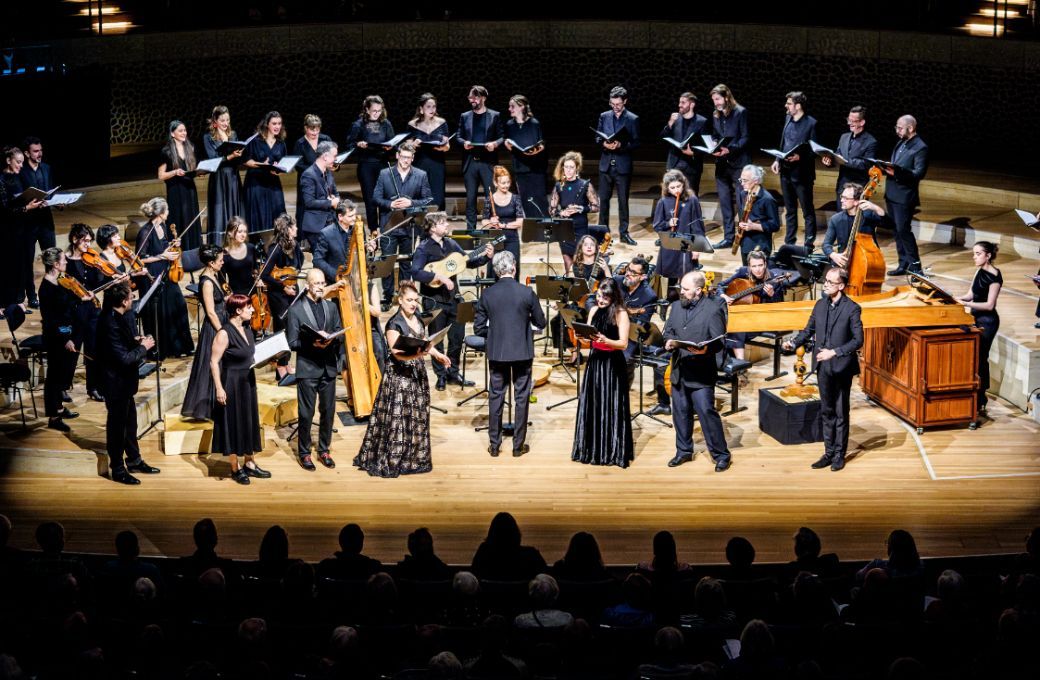Held in the Grand Hall of the Elbphilharmonie, this concert titled The Wedding of the Sun King transported the Hamburg audience back to 1660 to celebrate the grand union of Louis XIV and Maria Theresa of Austria. Under Vincent Dumestre and Le Poème Harmonique, the performance captured an era where music played a key role in royal ceremonies, reaffirming political power through art.
Recreating the splendour of Versailles in a modern venue is no small feat. The ensemble employed strategically choreographed musician entrances, spatial positioning and subdued lighting to conjure a sense of ceremony. However, the opening Jean-Baptiste Lully pieces faltered, with uneven brass intonation and monotonous percussion failing to deliver the expected grandeur. The mood shifted with a transcendent performance of Louis Couperin's Prélude no. 2 by organist Thierry Mechler, whose mastery of registrations and articulation created a solemn, immersive soundscape that felt perfectly at home in the hall's acoustics.
Jean Veillot's lengthy, monotonous motet didn't benefit much from the choir's theatrically designed entrances, but Lully's Grand Motet Jubilate Deo rescued the first half. Five stellar soloists delivered the work's celebration of political union and peace with remarkable precision, avoiding operatic excess. Of particular note was tenor Paco Garcia, whose impeccable breath control and elastic phrasing brought a reverent clarity to Lully's lines, adding a much-needed highlight to an otherwise formulaic first half.
Dumestre, much like a seasoned football coach, seemed to recognise the need for adjustments. The second half, dominated by Italian works, showcased a revitalised energy. Nivers' magnificent organ pieces and Salamone Rossi's devout instrumental Sinfonia set the stage for Cavalli's Magnificat à 8. This Venetian masterpiece was executed flawlessly, with Le Poème Harmonique's choir excelling in its portrayal of Venetian polychoral splendour. The eight-part fugue, centred on the words “Esurientes implevit bonis”, was captured with intricate vocal lines intertwining in rich, counterpointed textures. The music became both dense and radiant as the choir rose and fell with exquisite precision, creating a powerful sense of musical momentum. The instrumental ensemble also displayed newfound confidence and Ana Quintans, freed from the restraint of the first half, delivered commanding and penetrating vocals with effortless control.
The final section shifted to secular celebration. Mezzo-soprano Isabelle Druet delivered an unforgettable performance in Cavalli's extraordinary Lasciate mi morire from the opera Xerse. With a noble, restrained sorrow, her interpretation elevated this highly chromatic piece, although the inclusion of a lament in a wedding-themed programme remained puzzling. The concert concluded with soloists indulging in French and Spanish secular airs, eliciting laughter and applause from the audience. At the concert's conclusion, Dumestre briefly addressed the audience in French, explaining the editorial intent behind the programme.

Le Poème Harmonique successfully revived the sacred and secular duality of the era, using their signature improvisational flair and vibrant colours. While not flawless from a musicological perspective – a point that was never their aim – the programme effectively highlighted the remarkable fusion of French and Italian music of the time. Iconic royal instruments such as trumpets, oboes and timpani featured prominently, creating a near-tangible sense of early ceremonial grandeur. However, relying on an identical setlist from their related CD, without introducing compelling live visual elements or fresh interpretations, left room for innovation.


